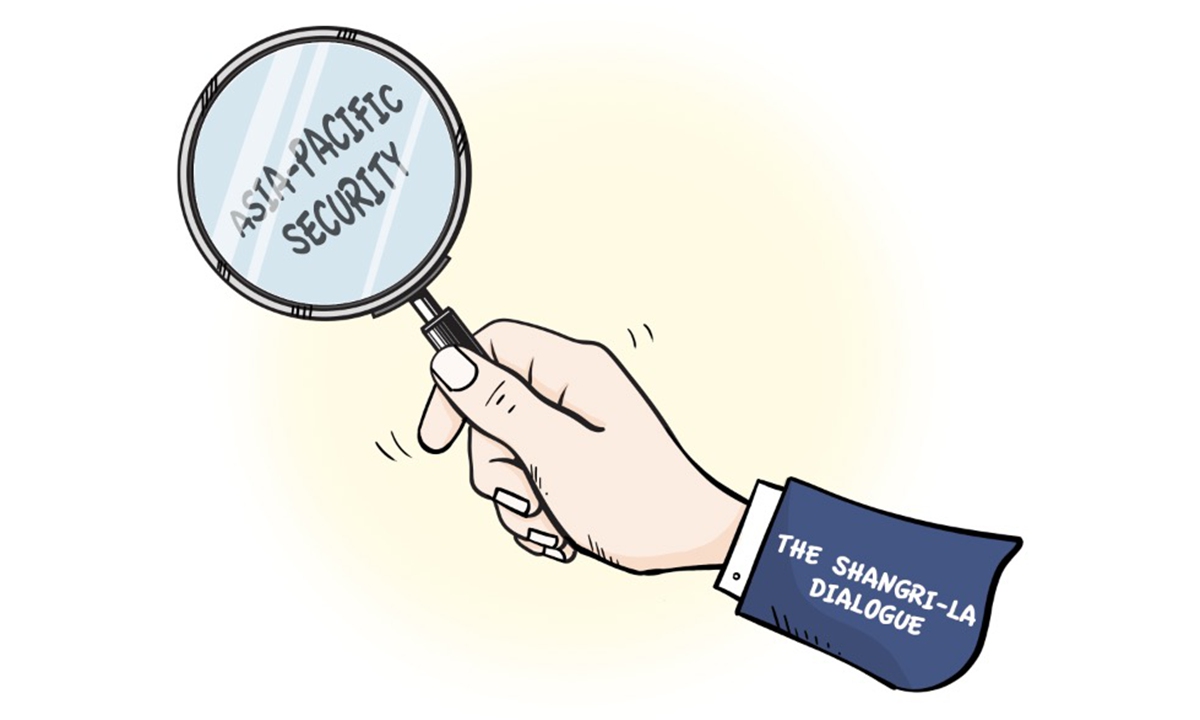
Illustration:Chen Xia/GT
The 19th Shangri-La Dialogue concluded on Sunday in Singapore. As a nine-time participant who has also attended this year's event, I noticed some differences from the previous Shangri-La Dialogue.
My first feeling is that the relationship between China and the US was constantly mentioned during this year's Dialogue. The forum's highlights were the speeches by the US and Chinese defense chiefs and the face-to-face meeting between these two officials.
The remarks made by Chinese State Councilor and Defense Minister Wei Fenghe on China's vision of regional order was scheduled for the morning on the last day of the forum. It has received particular attention: we witnessed an almost full house when Wei delivered his speech.
China-US military exchanges used to be realized through many channels, but they are disrupted or even halted due to the COVID-19 pandemic and Washington's increasing pressure on China over recent years. In this context, the meeting between the Chinese and US defense chiefs on Friday sent a positive signal.
In addition to China-US interactions, it is also worth noting the stances taken by regional countries at the 19th Shangri-La Dialogue. These nations hold different positions and values, but in general, most have clearly expressed that they don't want to take sides between China and the US. This includes ASEAN members Indonesia, Malaysia, and Cambodia. Only states like Japan and Australia have chosen to follow the US to attack China over security issues.
Judging from this year's forum, many regional countries are becoming more aware of the risks of a confrontation between the US and China. They are more worried that the clash of two powers will become the dominant concern in the Asia-Pacific affairs, further squeezing the room for regional nations to take action independently.
The Shangri-La Dialogue is also known as "Asia's premier defense summit." I have observed several Asia-Pacific security trends during this year's forum.
First, security issues in the Asia-Pacific region are gaining greater attention than ever. Now it seems Asia-Pacific is almost the only stable region in the world. But as the regional conflicts are intensifying, many are concerned if peace and stability can still be maintained in Asia-Pacific in the long run. This is why participants from so many countries came to Singapore for this year's event despite the COVID-19 epidemic.
Second, Asia-Pacific security is facing a contest of two concepts, roads and prospects. The US has pushed the idea of alliance and coterie that targets third parties and stimulates security hot spot issues from time to time. As a result, such an approach has clearly led to divisions and turmoil across the entire region.
On the other hand, China's idea is to build a community with a shared future for mankind and a "new security concept" embodied in the Global Security Initiative.
The competition between these two security concepts will provide the Asia-Pacific region with two different roads and prospects. And what kind of future they may lead to depends on the common choice of regional countries. But both China and the US should be aware that how they deal with each other and their ties will have a crucial impact on the future of regional security and global peace and stability.
Third, Washington seems to merge its alliance in Asia-Pacific and Europe gradually. The Shangri-La Dialogue is a forum mainly for Asia-Pacific security issues, not European ones. And even if there were European participants, they generally represented France, Germany, the European Union, and NATO.
In my observation, there were more European delegations this year than previous years. And when these European participants talked about Asia-Pacific issues or global security, they have certainly introduced Europe's security ideas to regional countries - a sign of integration between US' alliances in Asia and in Europe after the breakout of the Russia-Ukraine war.
Finally, the Shangri-La Dialogue appeared to be a relatively open and fair event, but this year it has shown a tendency toward becoming a values-driven forum.
For example, Russia used to be an active participant in the Dialogue. However, the Russian delegation didn't come to Singapore this year - it was not even invited, as far as I understand. And I didn't even see a Russian scholar at the forum.
Another example is the absence of the Myanmar delegation, even though Myanmar-related issues were on the agenda this year. This reflects what values the organizers of the Shangri-La Dialogue favor and what not.
The author is a research fellow at China's Academy of Military Sciences. opinion@globaltimes.com.cn




